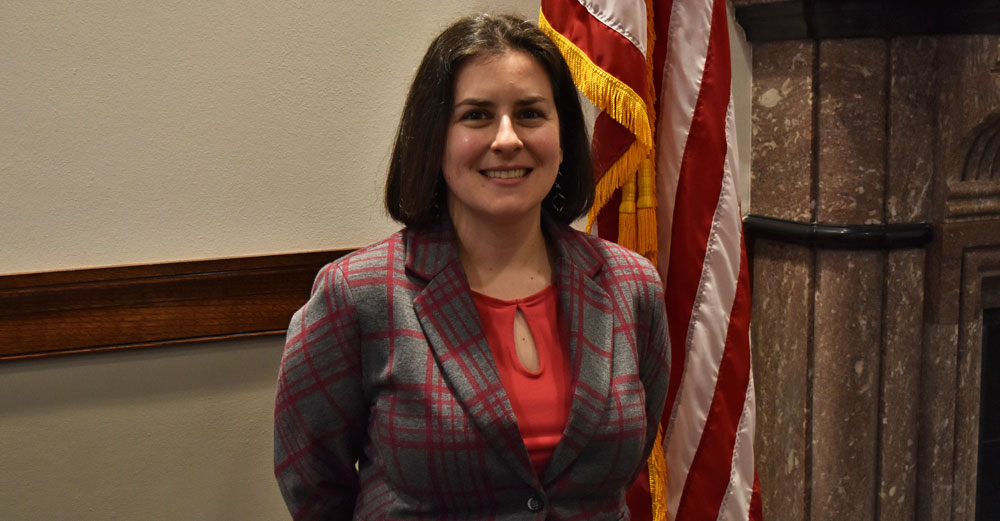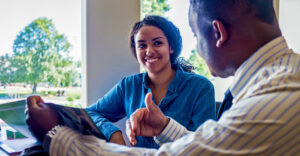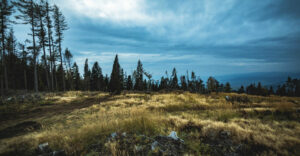
According to American playwright Neil LaBute, “everyone has a story.” That sentiment rings true for the nearly three million SUNY alumni worldwide, and especially those who can call themselves military veterans. The life stories they bring with them to school are ones that grab the hearts and minds of all who have an opportunity to hear them. University at Albany alum and veteran Amanda Matteson, who was recently featured on the news for her academic research and participation in SUNY System’s conference for veterans coordinators, educators, and student vets, is one such alum who has a unique story of her own.
In 2005, Amanda joined the Army National Guard, and served until 2011. During her time in active duty, she was deployed to Iraq in 2008 as part of Operation Iraqi Freedom, and returned to the United States in 2009, which spurred reflection about her future. While still in the National Guard, Amanda felt the need to do more now that she was back home, and she decided she wanted to go back to school.
After some time thinking her options over, Amanda chose to attend the University at Albany. Why? “UAlbany ultimately ended up being the school for me because of its affordability, the fact that the campus accepted benefits through the Post-9/11 GI Bill, its proximity to home, and it had a community feel.” During her undergrad, Amanda was still in the National Guard, but was no longer on active duty. She shares that she was drilling with the National Guard as a “weekend warrior” for one weekend a month and a couple of weeks a year, in addition to being a full-time student at UAlbany.
Amanda graduated from UAlbany with a bachelor’s degree in psychology and a minor in neuroscience in 2011, and she then entered the professional world where she worked for the federal government. She realized her passion for learning wasn’t over, and returned to pursue her master’s in social work, which she received in 2018. Currently, she is still continuing an academic pursuit and passion: Amanda is working toward receiving her Ph.D. from the School of Social Welfare at UAlbany, with plans to graduate in a couple of years.
In addition to taking classes, Amanda works for the SUNY Research Foundation and does program evaluation for a veterans’ peer-to-peer support program, which she has been doing for the past five years. This work—analyzing the elements of peer support between veterans—will ultimately be the focus of her dissertation, which she’ll begin working on next semester. Specifically, Amanda hopes to better understand how the different aspects of peer support can be helpful for veterans in all stages of their lives. She believes that peer support is beneficial for veterans, no matter if they’re transitioning into a civilian job or retiring, stating that “peer support is really helpful for pretty much anybody, because you have that lived experience that you share, and you can relate and understand.”
Naturally, Amanda’s own experiences with receiving and providing peer support from and to fellow veterans inspired her dissertation topic. A major impetus for her studying this area of support is to hopefully create more of an accepting and welcoming culture for veterans throughout society and on college campuses. During her time as an undergraduate student, Amanda shares that “even though UAlbany was a good, local school, I felt separate from the student body.” Thankfully, she soon met a couple of individuals who ended up forming the UAlbany Veterans Club, which is now the UAlbany Veterans Association. Amanda shares that knowing that other veterans and military-affiliated students were coming back to school and were facing challenges was a turning point for her and made her feel more connected.
Building on a community of shared experiences
The notion of veterans feeling more connected and supported is at the heart of Amanda’s work, and what she hopes to do post-graduation. “I would like to do a lot of things [after graduation]. Once I finish my dissertation, I would love to go back and work for the federal government and do research.” Amanda has also gained valuable teaching experience during her time as a doctoral student, so she also shares that she could see herself retiring from doing research to then teach future generations how to do this important work.
Amanda is also interested in social welfare as a whole, and is a big believer in mindfulness and holistic practices; in fact, it is one of her main areas of interest, along with peer support and “having options for people to get services in the manner they choose.” Mindfulness, which is “a mental state achieved by focusing one’s awareness on the present moment while calmly acknowledging and accepting one’s feelings, thoughts, and bodily sensations,” is beneficial for people with trauma, who oftentimes experience dissociation by way of their traumatic events. Dissociating can make it challenging to be within one’s body, and Amanda believes that “mindfulness helps us acknowledge that and integrate our body, mind, and spirit” into our consciousness. This practice of being mindful is up and coming, according to Amanda, and is “really reaching not only veterans, but active duty too,” which she sees as a good thing. “I think that’s great because not only do you need to train [people] to do their jobs really well, you need to train them how to take care of themselves as well, and I think mindfulness can help with that.”
Taking care of yourself is a major tenant of Amanda’s advice for other military-affiliated or veteran students who may wish to follow in her path, “… don’t forget to take care of yourself. Make friends, socialize as best you can. As hard as military people work, we need a break too.” She also relays how important it is to “reach out and connect with people, even if your experiences are different. Military and veterans bring a lot of excellence experience to the table,” and Amanda is no exception to this rule, with her vast service record and extensive background in academia.
Amanda’s story, essentially the telling of her life to-date, is inspiring. She has taken challenges and difficulties in life and turned them into opportunities to assist others by pursuing further education through SUNY. This work has subsequently led Amanda to discover her ultimate passion in life, and SUNY is proud to help support this passion and our support for military veteran personnel with access to a higher education made available in a large number of ways, including 100% online through new programs offered via SUNY Online. Amanda’s passion to help veterans through creating a culture where peer support and mindfulness are the norm is well on the path of being fulfilled.



